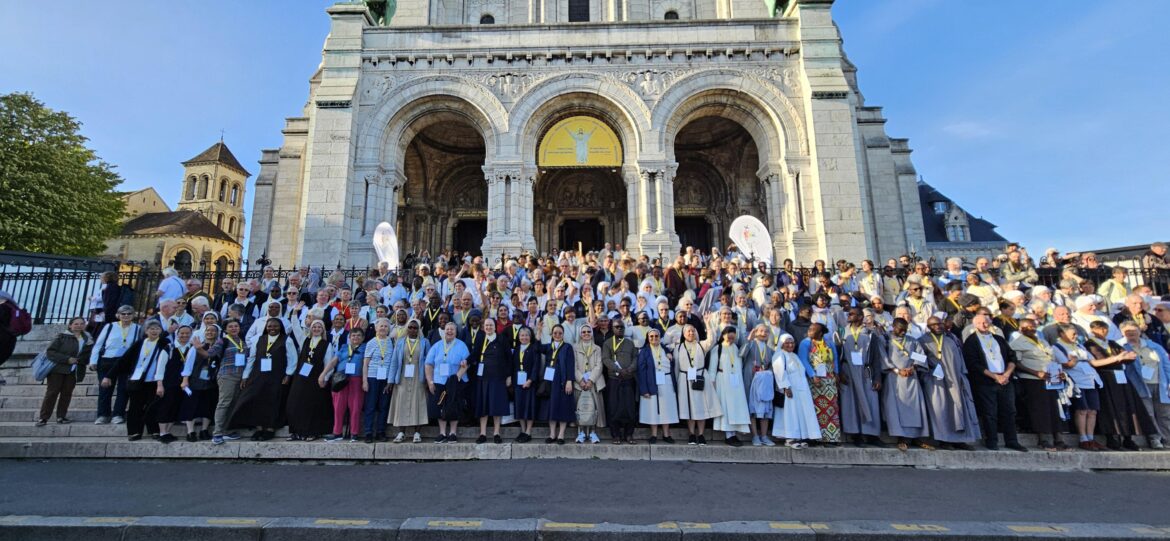PARIS (OSV News) — Spread between iconic churches of the City of Lights, such as Notre Dame Cathedral, St. Eustache and St. Sulpice, over 800 religious men and women, and members of institutes of consecrated lay people, gathered in Paris Sept. 6-7, for a National Jubilee of Consecrated Life.
The Conference of Religious of France, known for its French acronym CORREF, which represents 350 congregations, communities and institutes of consecrated life, coordinated the organization of these two days.
Since 2016, it has been presided over by Sister Véronique Margron, provincial prioress for Europe of the Dominican Sisters of the Presentation. “This project was part of the Jubilee of Hope celebrated in Rome this year,” she told OSV News. “The majority of religious will not be able to travel to Rome for the Jubilee of Consecrated Life in October. That is why we invited them to come to Paris.”
“These days of prayer and celebration together were magnificent,” Sister Véronique recounted. “There was a great variety of consecrated persons, monks, nuns of monastic or apostolic life, lay people, young … and old. The oldest was a sister over 90 years old in a wheelchair. We saw every possible religious habit imaginable. On Sunday … we all strolled through the streets of Paris in splendid weather, walking and praying along pre-planned routes. Everyone was happy.”
Addressing the abuse issue
On Sept. 6, participants visited the famed Sacré-Coeur, or Basilica of the Sacred Heart, at the top of Paris’ Montmartre hill. There, they symbolically participated in the creation of a mosaic rose window, created by Sister Samuelle, a nun-turned-hermit. Sister Samuelle is an artist and one of the alleged victims of psychological and sexual abuse by the Slovenian Jesuit priest and mosaic artist Father Marko Rupnik.
And this — the issue of abuse within religious communities — for Sister Véronique remains the most significant problem she has had to deal with during her nine years as president of CORREF, with her second term set to end in November.
With a doctorate in moral theology and training as a psychologist, she has personally listened to and supported many victims. “The issue has affected almost all male congregations, with a few rare exceptions,” she said. “Today, people are speaking out a little more freely, and every week new revelations of violence continue to emerge.”
In recent years, CORREF has laid the groundwork for far-reaching reforms of religious community structures, aimed at protecting its members from any possibility of abuse.
“We have set up working and training groups, with lay experts, to address issues of governance, possibility of manipulation of spiritual traditions, and sensitivity to weak signals,” Sister Véronique explained. “Excellent work has been done, and there is now no turning back. But we must remain cautious and now monitor how these recommendations are being implemented on the ground.”
With this in mind, Sister Véronique asked a professional sociologist to conduct a study on how these recommendations are actually implemented in different religious congregations. The results of this survey will be known in November. “This will give us an overall picture of the situation and show us what we can improve,” she explained. “In recent years, we have realized that in order to move forward, we need the help of outside observers.”
For Sister Véronique, it is the newer communities that find the reforms most difficult. “The older communities have already undergone reforms in the course of their history,” she noted. “They have sometimes strayed, but their origins were not corrupted. On the other hand, some new communities were founded on bases that were perverse or corrupted from the outset.”
The fact that some in those communities “have not realized anything and have moved forward with integrity despite corrupt frameworks” is the foundation for renewal, Sister Véronique said.
“They are the ones who are now courageously working to rectify what can be rectified and rebuild everything on a sound foundation. It is extremely difficult, fundamental work, and we must be extremely vigilant,” she told OSV News.
In the meantime, for Sister Véronique, the question of what to do with abusive priests and religious is crucial today.
The June 2 appointment of Father Dominique Spina gained widespread attention in the country after the French daily, La Dépêche du Midi, noted the priest’s 1993 conviction for sexually abusing a 16-year-old high school student, for which he was given a five-year prison sentence. A general outrage finally led Archbishop Guy de Kerimel to ask the priest to resign on Aug. 16.
A complex situation
For Sister Véronique, the issue remains extremely complex.
“There is no ready-made solution,” she emphasized. “Each case is different, and nothing is simple. But in most cases, men have used their status in the church to commit abuse. This status gave them an aura that they relied on to abuse their authority and exert control, which preceded sexual violence. We must therefore strip them of this status and, in consultation with the judicial authorities, see to what extent we can help them reintegrate into civil society. Because we must be clear-headed, not naive: the church cannot monitor these people.”
Despite a heavy burden of the abuse crisis on religious communities, Sister Véronique said she was “amazed” by the vitality of the consecrated persons who participated in the Jubilee in Paris.
“The number of vocations has fallen dramatically in religious communities,” she pointed out. “But wonderful foundations have been laid over the past 20 years. In particular, we have seen the emergence of residential homes for vulnerable people, women in precarious situations, homeless people and students who live with elderly people. They are true laboratories of humanity.”
She pointed out that “in religious communities themselves, people from very different backgrounds and cultures now live side by side,” and “This shows that by exercising caution and collaborating with others, we can create harmonious living spaces that are precious in today’s fragmented and brutal society.”
Caroline de Sury writes for OSV News from Paris.




